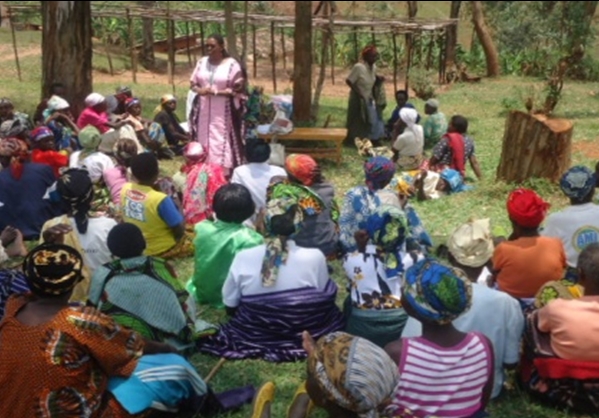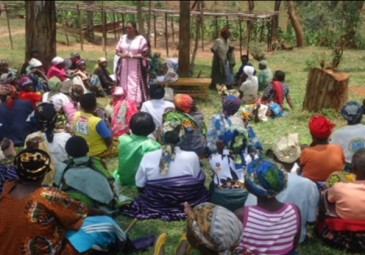
The Rwandan genocide undeniably represents one of the most appalling events in recent human history, and its legacy will continue to affect the lives of those who survived it, in the years to come.
Twenty years after the genocide, Rwanda is a country that has made remarkable economic strides, and whose society is undergoing significant social and cultural changes. Women have undoubtedly been at the centre of this process of transformation and, as the literature review has extensively reported, they have attained prominence in politics and public affairs. As Burnet (2011) highlights, the increased presence of women in Rwandan politics has raised ‘awareness of what women can achieve and legitimate women as political actors, unravelling at least to some degree previously accepted gender roles‘ (p. 315).
However, due to the nature of the Rwandan state, it is unclear the extent to which women in Rwanda can actually influence political outcomes and achieve gender equality (Longman, 2006; Reyntjens, 2010; Burnet, 2008, 2011). The various reforms introduced by the Rwandan government have somewhat extended women’s rights but there is evidence that a significant portion of the male population remains resistant to changes in gender relations.
Widow survivors of the genocide find themselves in a uniquely disadvantaged position due to a variety of factors. To start, they are women without husbands in a society that has traditionally been centred around the needs and desires of men. Following the loss of their spouses, they have to provide for themselves and their dependents without the support they could rely on prior to the genocide. Simultaneously, they face stigmatization, often owing to the fact that many of them were victims of sexual violence, and subsequently contracted HIV during the violence of 1994.
Furthermore, most widows of the genocide never obtained a qualification at school, nor experience of economic activities, thereby leaving most without the knowledge and skills necessary to secure a livelihood. In many cases, the trauma associated with the genocide has made widows distrustful of people, which then relegates them to an even more isolated place in society.
AVEGA Agahozo has been supporting widows of the genocide for almost twenty years, by attempting to reintegrate them into Rwandan society. The SIP programme represents its most ambitious project to date, with the aim of helping widows to become self-reliant. Cultivating the economic wherewithal of widows is seen as crucial for allowing them to reclaim their dignity and self-worth, while also increasing their children’s chances for a better future.

The foregoing research, though limited, has highlighted a significant number of positive effects that AVEGA’s IGA training has had on its beneficiaries.
Widows are now capable of generating the income necessary to afford food, clothes and decent accommodation, as well the various costs associated with their children’s education. The fact of their involvement in economic activities also represents a major source of bolstered identity and self-worth, and this has radically changed the way in which they are perceived by the rest of their communities.
The findings of this study also illustrate that after completion of their training, widows are confident and skilled enough to not only succeed in their economic ventures, but also to expand them, thus extending the benefits of their efforts to society as a whole. Widows have gained the capacity to independently apply for further loans, as they have earned the trust of banks, and have sufficient knowledge of the loan process. They also employ other community members to cultivate their land and transport their goods, as well as to look after their children when they are away. Hence, widows promote positive change not only for themselves as individuals, but also for the wider community. Remarkably, the enhancement in their status within the community was also seen to lead to an improvement in their relationships with génocidaires and their families, providing hope for a more peaceful future.
The group structure of the AVEGA initiative appears to be the catalyst for promoting positive change in widows’ lives, as well as in those of their families and communities. Within the group, widows learn how to commence and develop their economic activities; from its members, they receive the support they need when dealing with the hardships of being businesswomen, household breadwinners and carers, all at the same time. Furthermore, it is the group setting that facilitates confidence-building, by allowing widows to learn within a protected environment, and helping them to overcome the isolation that they have experienced since the genocide.
It is uncertain whether AVEGA and its partners will have the means to continue to implement SIP, and as such, doubts remain regarding the long-term sustainability of the programme. Considering the relative youth of the programme, there will be a critical need for AVEGA and its partners to continue monitoring the experiences of beneficiaries, and conducting regular evaluations of the programme’s outcomes, in order to strengthen it.
For the present moment – and this is what the research herein aimed to establish when it was conceived – there is evidence that AVEGA’s IGA training has been successful in expanding widows’ capabilities and empowering them.
The conclusion of “Transforming lives: An analysis of the impact of the AVEGA’s IGA training programme in empowering widows of the genocide and promoting gender equality in Rwanda’s Eastern Region” – a report by Lorenzo Picco.
Download the full report here.
